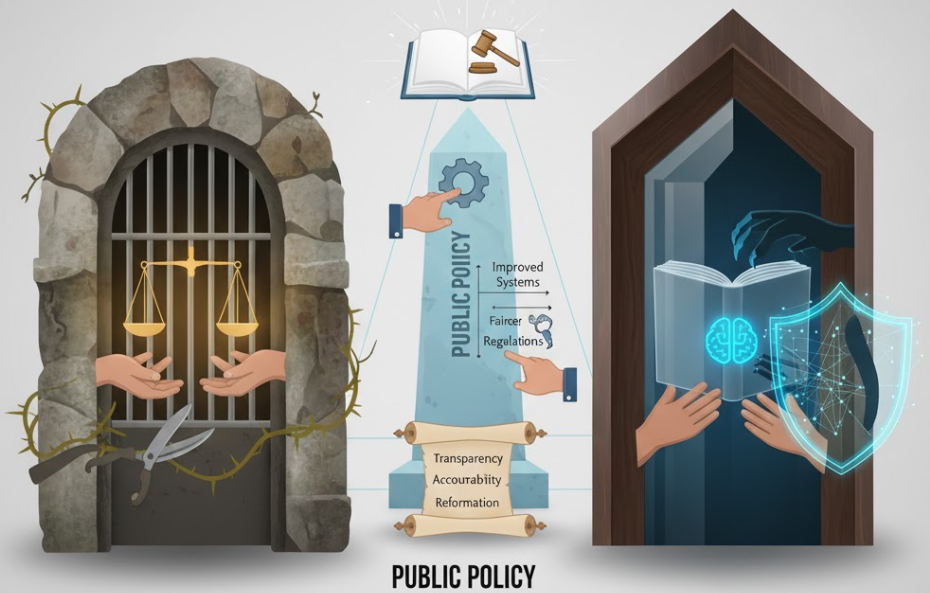Prevention of Abuse of Authority, An Analysis of Integrity at Class IIA Sragen Correctional Facility and Class I Surakarta Detention Center
Pencegahan Penyalahgunaan Wewenang, Suatu Analisis Integritas Di Lapas Kelas IIA Sragen dan Rutan Kelas I Surakarta
DOI:
https://doi.org/10.21070/jkmp.v13i2.1841Keywords:
abuse of authority, accountability, correctional, governance, integrityAbstract
Abuse of authority in correctional institutions is a problem that can threaten the legitimacy of public administration. This study investigates the application of integrity as a mechanism to prevent abuse of authority in Technical Implementation Units for Corrections, namely the Class IIA Correctional Institution in Sragen and the Class I Detention Center in Surakarta. Using qualitative descriptive methods and the six-dimensional integrity framework proposed by Leo Huberts (2014), this study explores key components including system integrity, moral virtue, accountability, openness, rule enforcement, and exemplary behavior. Data were collected through interviews, observation, and documentation. The results of the study show that integrity at the Sragen Class IIB Prison is based on formal work rules and implementation by Satops Patnal, reinforcement in assembly forums, reinforcement of religious values, monthly reports, participatory facilities, and role models for officers. Meanwhile, what is different at the Surakarta Class I Detention Center is the existence of body checks on employees, checks on employees' belongings, and reviews of conditions. Integrity fosters a work culture that not only prevents violations through rules and sanctions, but also maintains ethical behavior through religious guidance, moral examples, and participatory monitoring. This study emphasizes that institutional integrity must be cultivated as a shared organizational value rather than a reactive response to violations. By instilling integrity across all operational, behavioral, and cultural dimensions, correctional institutions can create a robust system that minimizes opportunities for abuse of authority.
References
Akbar, K., Pasha Karim, Z., Fadlullah, N., & Siddiq Armia, M. (2021). Sistem Pengawasan Dana Otonomi Khsusus Aceh dan Dampaknya terhadap Pemberantasan Korupsi. Integritas : Jurnal Antikorupsi, 7(1), 101–120. https://doi.org/10.32697/integritas.v7i1.719
Ayub, Z. A., Wahab, H. A., Yusoff, Z. M., Zan, Z. M., & Shariffuddin, M. D. K. (2021). Policing The Police in Malaysia: Comparative Views. Central Asia and the Caucasus, 22(5), 1004–1015. https://doi.org/https://doi.org/10.37178/ca-c.21.5.080
Beijersbergen, K. A., Dirkzwager, A. J. E., Eichelsheim, V. I., Van der Laan, P. H., & Nieuwbeerta, P. (2015). Procedural Justice, Anger, and Prisoners’ Misconduct: A Longitudinal Study. Criminal Justice and Behavior, 42(2), 196–218. https://doi.org/10.1177/0093854814550710
de Graaf, G., Huberts, L., & Strüwer, T. (2018). Integrity Violations and Corruption in Western Public Governance: Empirical Evidence and Reflection from the Netherlands. Public Integrity, 20(2), 131–149. https://doi.org/10.1080/10999922.2017.1350796
Edward, A. V., Adnan, M. F., & Khaidir, A. (2024). New Public Manajemen: Studi Kasus Penerapan New Public Manajemen dalam Organisasi Publik di Indonesia. Future Academia : The Journal of Multidisciplinary Research on Scientific and Advanced, 2(2), 54–62. https://doi.org/10.61579/future.v2i2.97
Eshet, Y. (2023). Internal auditor’s interpersonal trust building: the Israeli public sector. Journal of Public Budgeting, Accounting and Financial Management, 35(5), 587–607. https://doi.org/10.1108/JPBAFM-02-2023-0021
Fakhrurrozi, I., Asropi, & Istania, R. (2025). Model Kepemimpinan dalam Peningkatan Kinerja Pegawai di Lingkungan Kedeputian Bidang Informasi dan Data Komisi Pemberantasan Korupsi. Jurnal Kolaboratif Sains, 8(6), 3067–3079.
Fujilestari, N. A., Rochaeni, A., & Ramdani, W. (2025). Memperkuat Pengawasan: Memetakan Kedudukan Inspektorat Dalam Menjamin Akuntabilitas Dan Integritas Pada Era Transparansi. Moderat : Jurnal Ilmiah Ilmu Pemerintahan, 11(1), 314–324. https://doi.org/10.25157/moderat.v11i1.4148
Koeswayo, P. S., Haryanto, H., & Handoyo, S. (2024). The Impact of Corporate Governance, Internal Control and Corporate Reputation on Employee Engagement: A Moderating Role of Leadership Style. Cogent Business and Management, 11(1). https://doi.org/10.1080/23311975.2023.2296698
Muballigin, A. (2024). Pembangunan zona integritas merupakan program kebijakan Kementerian Hukum dan Hak Asasi. Indonesian Journal of Humanities and Social Sciences, 5(4), 2187–2200.
Pamungkas, P. (2025). Etika Administrasi dalam Membangun Integritas Publik. Civic Education Perspective Journal, 5(1), 42–52. https://doi.org/10.22437/cepj.v5i1.41723
Pedrosa, A., Alm, S., Roxell, L., & Manchado, M. (2024). God Moves in Mysterious Ways: Faith Units and Their Influence on Prison Governance in Argentina and Sweden. European Journal of Criminology, 21(2), 191–209. https://doi.org/10.1177/14773708231160921
Rifdah, S. O., & Dzunuwanus, G. M. (2025). Pengaduan Masyarakat melalui Aplikasi Bebunge di Kabupaten Bekasi. JPGS (Journal of Politic and Government Studies), 14(2), 1–17.
Steiner, B., & Wooldredge, J. (2018). Prison Officer Legitimacy, Their Exercise of Power, and Inmate Rule Breaking. Criminology, 56(4), 750–779. https://doi.org/10.1111/1745-9125.12191
Suryani, Y. (2023). Analisis Pemetaan Sumber Daya Manusia Dalam Rangka Pembangunan Zona Integritas Menuju Wilayah Bebas Korupsi Dan Wilayah Birokrasi Bersih Melayani Pada Balai Diklat Keagamaan Ambon. Uniqbu Journal of Social Sciences (UJSS), 4(1), 53–66. https://doi.org/https://doi.org/10.47323/ujss.v4i1.269
Syakoer, M. (2023). Integritas yang Kokoh dalam Membentuk Kepribadian ASN. J-MAS (Jurnal Manajemen Dan Sains), 8(1), 922. https://doi.org/10.33087/jmas.v8i1.1187
Wahyu hidayat, Junaidah, & Muhammad Suhardi. (2025). Peran Kepemimpinan Religius Dalam Membangun Budaya Organisasi Pendidikan Yang Humanis Dan Etis. Al-Mahabbah : Jurnal Manajemen Pendidikan Islam, 1(2), 89–99. https://doi.org/10.62448/ajmpi.v1i2.315
Wardiyanto, B., Setijaningrum, E., Samad, S., & Kandar, A. H. (2025). Mending the mismatch of minds and mandates: reimagining competency-centric public service delivery in Bojonegoro Regency, Indonesia. Cogent Business and Management, 12(1). https://doi.org/10.1080/23311975.2024.2442538
Yunanto, R. A., & Subroto, M. (2023). Integritas Pemimpin Terhadap Kedisiplinan Pegawai Di Lembaga Pemasyarakatan Kelas Iib Cilacap. Jurnal Pendidikan Kewarganegaraan Undhiksa, 11(3), 57–61. https://ejournal.undiksha.ac.id/index.php/JJPP/article/view/68669
Yusuf, M., Masrokan Mutohar, P., & Fuadi, I. (2024). Aktualisasi Nilai-Nilai Etik dalam Membentuk Efektifitas Budaya Organisasi Lembaga Pendidikan. AKSI: Jurnal Manajemen Pendidikan Islam, 3(1), 17–36. https://doi.org/10.37348/aksi.v3i1.510

Downloads
Published
License
Copyright (c) 2025 Satrio Surya Atmaja, Naniek Pangestuti

This work is licensed under a Creative Commons Attribution 4.0 International License.















